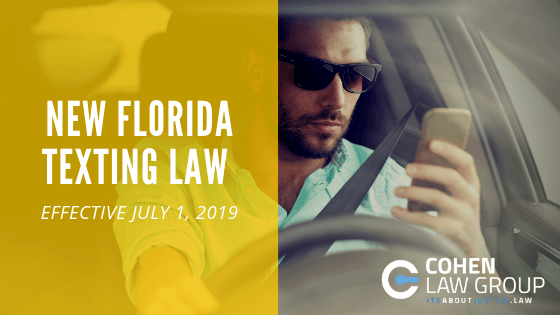New Florida Texting Law Effective July 1, 2019
By Ana Cristina Rossi, Esq.
Put your phone down while driving! We all know how dangerous it is to text while driving and the Florida legislature has done something about it. Florida joins 43 other states which allow law enforcement to pull over drivers for texting while driving.
The new law, which was signed by Gov. Ron DeSantis on May 17, 2019, went into effect on July 1, 2019. In explaining his support for the bill, Gov. DeSantis stated that Florida had almost 50,000 motor vehicle accidents in 2016 which were caused by distracted driving and 233 of these accidents resulted in fatalities.
Here Are Answers To Questions People Have About The New Law:
How does this new law change the prior law on texting while driving?
The new law now makes texting while driving a primary offense, meaning that law enforcement can pull you over if they suspect that you are texting on your phone while operating a vehicle. Previously, texting while driving was a secondary offense, meaning that a driver could only be cited for texting while driving if they were pulled over for another offense.
What’s the penalty?
For a first offense, the fine is $30 and for a second offense, the fine is $60. You will also be responsible for paying court costs.
A first offense will be treated as a non-moving violation; a second offense will add 3 points on your license.
Can you use your phone while you are stopped at a traffic light?
Yes, the new law permits drivers to use their phones in a motor vehicle which is stationary.
Can law enforcement confiscate your phone if they see you texting while driving?
No, law enforcement are trained to detect the signs of texting while driving and are not permitted to confiscate or otherwise access your phone without a warrant.
While the law took effect on July 1, 2019, law enforcement will only be issuing warnings until January; after that, officers will start to issue citations.

Ana Cristina Rossi, Esq.
Learn more about Ana Cristina here!
DISCLAIMER: This website is for informational purposes only and does not provide legal advice. Please do not act or refrain from acting based on anything you read on this site. Using this site or communicating with Cohen Law Group through this site does not form an attorney/client relationship. This site is legal advertising. Please review the full disclaimer for more information by clicking here.

